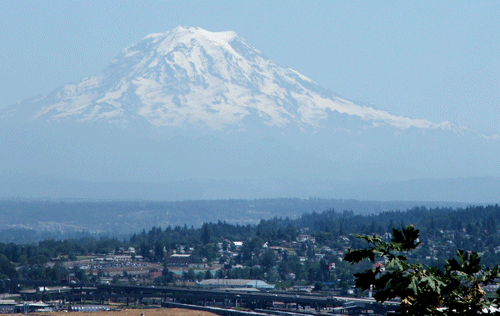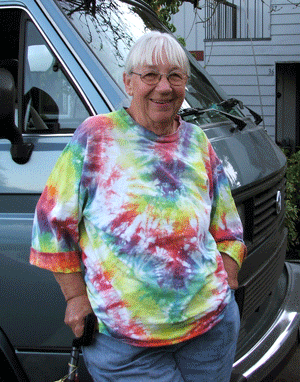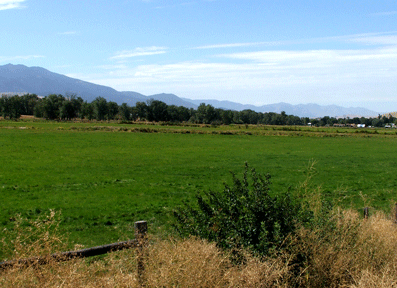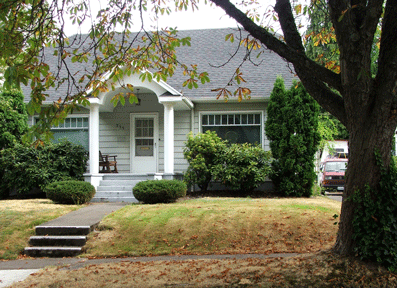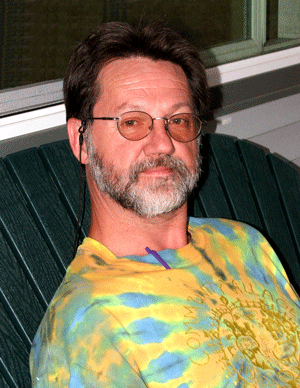I traveled the Pacific Northwest going from person to person, meeting vanagonauts, family, and other listserv friends. I got an email from Andrew while I was on the Olympic Peninsula in response to a Vanagon list discussion of whether VW owners wave to each other on the road. He sent a picture of Crusty, his brown and tan van, and said I should wave if we passed on the road. He also mentioned that if I needed to place to camp on Bainbridge Island I was welcome. Well, as it turned out I did need a place to stay on Bainbridge Island, and I took him up on his offer. I guess I’ve come a long way in my travels; I didn’t even worry about the fact that I didn’t know him from a hole in the ground and for all I knew he might be an axe murderer.
Of course he isn’t an axe murderer. We got along right away, and spent hours chattering about vans, relationships, work, and life past, present, and future. We ate out, picked blackberries until we were all scratched up, and watched a DVD of The Old Man and the Sea. At times we sat at our respective laptops browsing the internet and emailing each other particularly interesting findings.
Andrew is about my age. He hails from rural Maine, but has been in and out of the Pacific Northwest for years. While I was trudging through years of college and graduate school, Andrew owned a small grocery store in a Maine ski town, getting a practical hands-on education in how to make a business profitable, how to manage staff, how to deal with customers and suppliers and whoever else plays a role in the success of a retail operation. His family owned a motel and restaurant, and he grew up working there, so he wasn’t starting from zero. But I sure couldn’t have opened a business at nineteen and actually made it work. In time he segued from retail to construction, and for decades he has renovated homes for a living, including a few of his own. Most recently, he left Gloucester, Massachusetts to move for the third (or perhaps fourth?) time to the Seattle area, agreeing to spend a year living in and fixing up a home that belongs to a good friend of his. He’s not sure what he’ll do after this; he’s thinking of going to college full-time and getting a different kind of education from the one he’s already had. I think it’s a great idea – I can just imagine him immersed in philosophy, say, or thirteenth century Persian poetry, or perhaps creative writing.
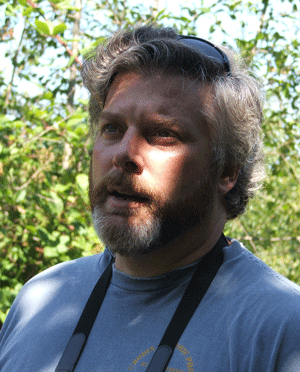 |
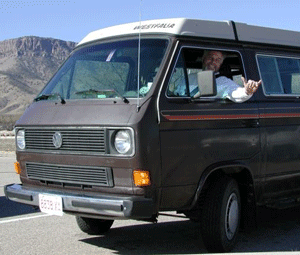 |
|
Photo of Crusty courtesy of Andrew Martin. |
I left Andrew’s house – well, his friend’s house – on a Monday morning and headed to Federal Way to have lunch with someone else I didn’t know. I am on the family clan listserv of Al Gilman, the widower of my old friend Marion. While she was alive, I became friends not only with her husband, but with his first wife Judy and their daughters Anne and Nancy. I often attended holiday dinners with the whole lot of them - Marion, Al, Judy, her husband Carl, children by all of their previous marriages, and various spouses of the children. So it was natural for me to be on the Gilman clan listserv as well.
Jim, whom I had lunch with that day, is also on that list, though his connection to the clan is almost as tenuous as mine. He was born in China, to Chinese parents who were active in national politics in the early 1940s. When he was eighteen months old, his father had to flee to “free China,” and left him with the Browns, an American missionary family who ended up adopting him. When they escaped the revolution and returned to America, he went with them. When he was a teen-ager and in prep school, the Browns returned to China, leaving Jim in the US to finish his schooling. They placed him under the care of another family that had been missionaries in China, Al’s grandfather Bishop Gilman. The Gilmans became Jim's adoptive family; by then he considered the Browns to be his real family, and had lost touch with his biological parents.
On the Gilman clan list, Jim is both feisty and poetic. He likes to travel, and has written lovely, evocative pieces about his trip to Europe with his daughter and his cruise up the Danube with his sister. He has written some fascinating pieces about his boyhood experiences in China, which rendered vivid what for me is a piece of history that I know more from novels than from any other source. He is also a liberal and outraged about the current political situation in the US. So he posts angry emails about the Iraq war, links to blogs from Baghdad, furious thoughts about energy policy, and scathing comments about the elections of the past few years. He and I had exchanged a few off-line emails, and I knew I wanted to meet him.
